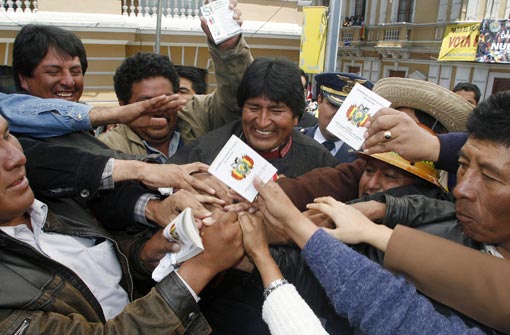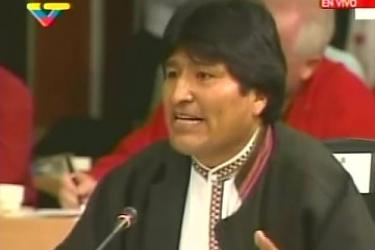Bolivia
Cuba and ALBA let down Sri Lanka’s Tamils
By Ron Ridenour
"Those who are exploited are our compatriots all over the world; and the exploiters all over the world are our enemies… Our country is really the whole world, and all the revolutionaries of the world are our brothers." -- Fidel Castro.[1]
“The revolutionary [is] the ideological motor force of the revolution…if he forgets his proletarian internationalism, the revolution which he leads will cease to be an inspiring force and he will sink into a comfortable lethargy, which imperialism, our irreconcilable enemy, will utilize well. Proletarian internationalism is a duty, but it is also a revolutionary necessity. So we educate our people.” -- Che Guevara.[2]
November 14, 2009 -- I think that the governments of Cuba, Bolivia and Nicaragua let down the entire Tamil population in the Democratic Socialist Republic of Sri Lanka, as well as “proletarian internationalism” and the “exploited”, by extending unconditional support to Sri Lanka’s racist government.
Hugo Blanco: Indigenous people are the vanguard of the fight to save the Earth
October 13, 2009 -- Socialist Voice -- Peruvian peasant leader Hugo Blanco, who edits the newspaper La Lucha Indigena, was interviewed on August 28, 2009, in Arequipa, in southern Peru. The previous day he gave a presentation at a conference entitled “40 Años de la Reforma Agraria” at the city’s Universidad Nacional de San Agustín.
You said last night that today the Indigenous peoples of the Amazon are in the vanguard of the struggle in Peru. Can you say more about this?
Claudio Katz.
Claudio Katz interviewed by Fernando Arellano Ortiz. Translated by John Mage for IIRE.
July 10, 2009 -- The exit from the systemic crisis of capitalism needs to be political and "a socialist project can mature in this turbulence". So says the Argentine economist, philosopher and sociologist Claudio Katz, who also warns that the "global economic situation is very serious and is going to have to hit bottom, and now we are but in the first moment of crisis".
Bolivia's vice-president defends MAS government’s record
Interview with with Álvaro García Linera, vice-president of Bolivia, by Maristella Svampa, Pablo Stefanoni and Ricardo Bajo, from August 2009 Bolivian edition of Le
The Economist forced to back down over lies on Venezuela and Bolivia

Raúl Prada Alcoreza: Analysis of Bolivia's New Political Constitution of the State

Bolivians celebrate their new constitution. President Evo Morales in centre.
The following article by Raúl Prada Alcoreza was originally published in the first issue (June 2008) of Crítica y Emancipación, a biannual Latin American journal of the social sciences. This translation from the Spanish, by Shana Yael Shubs and Ruth Felder, was published this year in a complete English-language version of the journal’s first issue. It was distributed at the recent congress of the Latin American Studies Association, held in Rio de Janeiro, Brazil, in June. A review of the first issue of Crítica y Emancipación was published at http://tinyurl.com/nuk4jp. This article also appeared at Bolivia Rising.

By Federico Fuentes
June 1, 2009 -- Addressing the 400-strong May 21 workshop with workers from the industrial heartland of Guayana, dedicated to the “socialist transformation of basic industry”, Venezuelan President Hugo Chavez noted with satisfaction the outcomes of discussions: “I can see, sense and feel the roar of the working class.”
“When the working class roars, the capitalists tremble”, he said.
Chavez announced plans to implement a series of radical measures, largely drawn from proposals coming from the workers’ discussion that day. The workers greeted each of Chavez’s announcements with roars of approval, chanting “This is how you govern!”
Chavez said: “The proposals made have emerged from the depths of the working class. I did not come here to tell you what to do! It is you who are proposing this.”
Nationalisation and workers’ control
World farmers’ alliance Vía Campesina challenges food profiteers (excerpt from new pamphlet)
Review by John Riddell
La Vía Campesina: Globalization and the Power of Peasants by Annette Aurélie Desmarais. Fernwood Publishing, 2007.
May 31, 2009 -- The neoliberal assault that has driven labour into retreat over the last two decades has also sparked the emergence of a peasants’ international, La Vía Campesina. Based in 56 countries across five continents, this alliance has mounted a sustained and spirited defence of peasant cultivation, community and control of food production.
Annette Desmarais’s book on La Vía Campesina has given us a probing and perceptive account of the world peasant movement’s origins, outlook and activities. (”La Vía Campesina” means “Peasant Path” or “Peasant Way”. See “Peasants or Farmers?” at the end of this article.)
Interview with Bolivia's foreign minister: `Communitarian socialism will refound Bolivia’
Interview with Bolivia’s foreign minister David Choquehuanca by Patricia Bravo and Cris González, translated from the original article in the March 20, 2009, edition of
Bolivia: Rich countries must pay their `ecological debt'

Submission by Republic of Boliv

Translated by Federico Fuentes
Cumaná, April 17, 2009
The heads of state and governments of Bolivia, Cuba, Dominica, Honduras, Nicaragua and Venezuela -- member countries of the Bolivarian Alternative for the Peoples of Our Americas (ALBA) -- consider that the proposed Declaration of the 5th Summit of the Americas is insufficient and unacceptable for the following reasons:

Evo Morales: `I declare myself Marxist ... now let the OAS expel Bolivia'
During his intervention at the seventh ALBA Summit, Bolivia's president Evo Morales recalled the 1962 documents of the Organisation of American States (OAS) that resulted in Cuba being expelled from the organisation, and outlined the importance of reflecting on the motives of that expulsion.